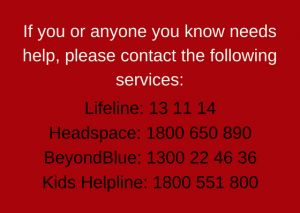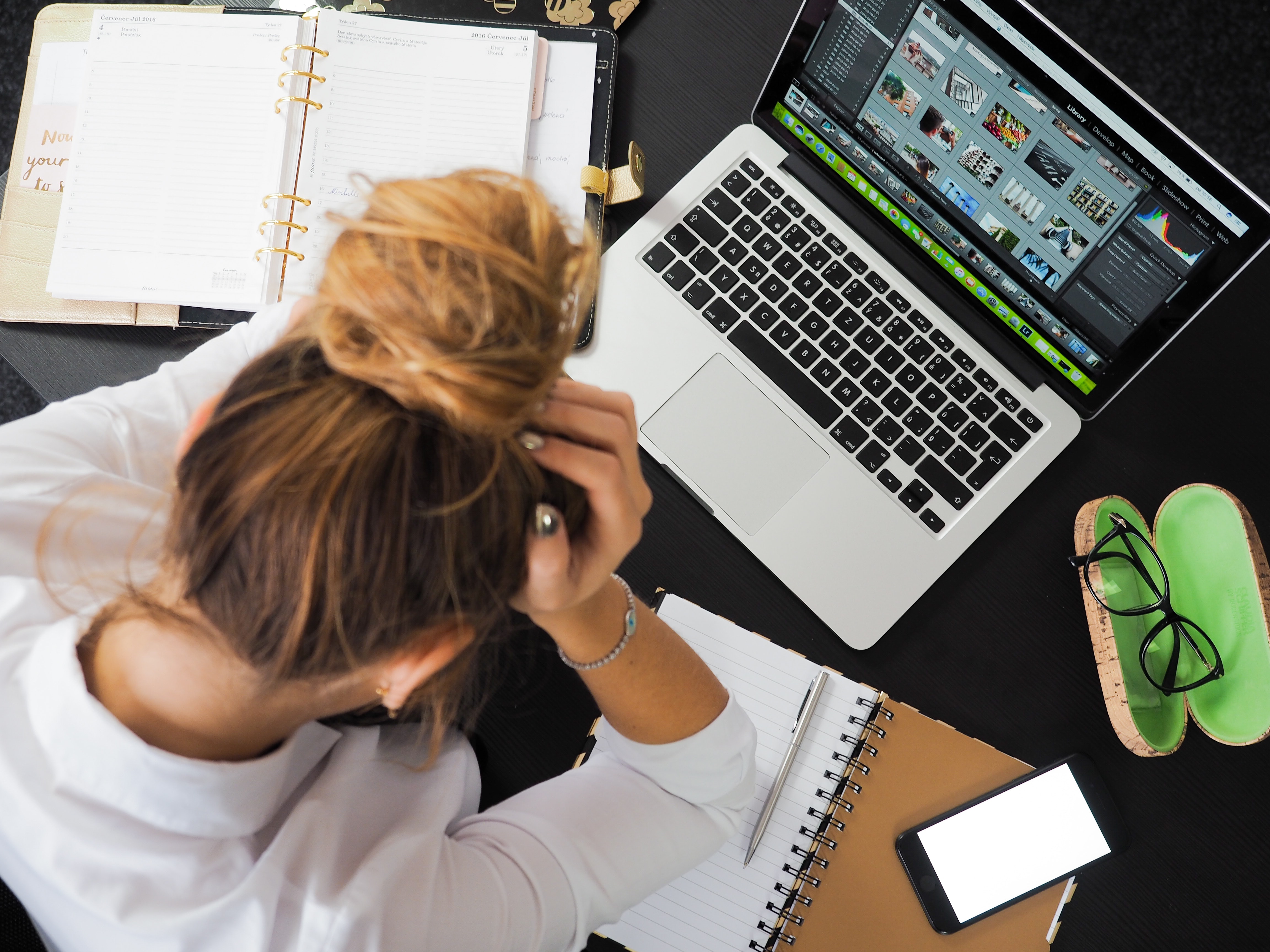At least one in four of the 1.4 million students at Australian universities experience mental health issues every year, according to data from The National Centre of Excellence in Youth Mental Health.
That would be, roughly, eight people in your average class of 25.
Last year, La Trobe University counselling services saw 2,800 people and noticed an increase in waiting times. Counselling service manager, Leah Du Plooy, said that recognising mental health is all about reading your body and understanding that you need help if you’re not feeling okay.
“I think [mental health issues] have always been there. The positive thing is now that we are talking about it a lot more and, we’re trying to break down the stigma of mental health,” she told upstart.
“I hope that the reasoning behind the statistic increase is due to awareness and people [being] more willing to speak up.”
What is stress?
Stress is a major part of mental health that is often overlooked compared to other issues such as depression, bipolar and suicide.
However, it’s important to understand the difference between stress and anxiety, which are often used interchangeably.
According to Dr Grant Blashki, General Practitioner and Lead Clinical Advisor at Beyondblue, stress is used as a general definition or emotion. It is usually used as a term to describe people who are in a difficult situation or are overwhelmed.
Anxiety is a clinical condition that requires a diagnosis, and occurs when there is a chemical imbalance in the brain and often can’t be controlled. It is important to note that anxiety is an illness that cannot be prevented.
According to Beyondblue, stress is a normal reaction in situations where we feel under pressure. The chemicals that are released in our brain can make it hard to think clearly, and irrationalise our thoughts.
What happens when we get stressed?
Dr Blashki told upstart that a bit of stress and anxiety is helpful and normal in life, and gives people motivation to change things.
However, regularly experiencing high levels of stress can have a strong impact on daily activities, such as eating habits, social engagement and exam study.
 “When stress and anxiety overshoots, it makes functioning worse,” he said.
“When stress and anxiety overshoots, it makes functioning worse,” he said.
Most people don’t understand the actual physiological processes around mental health.
According to Blashki, our autonomic nervous system is designed to helped us with a fight or flight response – we decide to triumph and address the issue, or let the problem override us.
When we feel stressed or anxious, our nervous system gets a spurt of energy, causing our heart rate to increase. When this occurs, the autonomic system starts to over-react to everyday stresses such as exam worries.
Panic attacks, social anxiety, obsessive compulsive disorder, poor diet and sleep disturbance are all signs of severe stress and anxiety.
Why is studying stressful?
At uni, there is the stress of employment which often depends on one’s performance in school. But studies from the Australia’s Biggest Mental Health Check-In suggest that stress and anxiety continue into the workplace as well.
“Increasingly, students are worried about types of work and location. There is now a high pressure to get good results,” Dr Blashki said.
“There’s a lot of pressure, it’s a major transition time. Negotiating relationships and forming identities, it’s a really important time in young people’s lives.”
Students feel high pressures around exam periods, forcing themselves to study for endless hours. Although this is normal, it is important to recognise when exam stress is overriding your life.
“It is important to pick up on overactive stresses, as it can fluctuate quickly,” Dr Blashki said.
“During exam time especially, it can be hard to note the difference between normal stress and anxiety signals.”
Leah Du Plooy says that the La Trobe counselling services have a higher rate of students using their drop-in services during mid semester and exam periods.
“I think this age group has always struggled with mental health,” she said.
Du Plooy added that students often come in after years at university, not knowing all the assistance that can be provided.
 How to deal with the stress of uni life
How to deal with the stress of uni life
Du Plooy says that the best way to handle the stress and anxiety of university is finding balance.
Good mental health is maintained by eating well, sleeping well and having a good balance between work, study and downtime.
Sleep is also important to staying healthy. Du Plooy says one of the worst things that can come from high stress levels is lack of sleep.
Residential Assistant and Glenn College student, Nat Corboy regularly provides mentoring sessions for residents on managing student life.
“I found that most students were afraid to ask for help. I think this is the biggest hurdle to face,” Corboy said.
During the compulsory mentoring sessions for the residents, the advisors focus on tips and tricks to evenly breakdown their daily schedules, including activities like sports, work, social outings and study.
“It’s so important to break it down, what have you done, what do you feel confident on. It’s so important for them to know what they know and what they don’t know,” Corboy said.
He also finds using a diary that includes study time and downtime is also beneficial.
 Having a general time frame to work off will allow you to see what needs to be done and how much time you have to do it.
Having a general time frame to work off will allow you to see what needs to be done and how much time you have to do it.
Another particularly stressful time can be exams. In the lead-up, many students isolate themselves in study and preparation.
Keeping yourself quarantined at your desk isn’t healthy for your mental health in a stressful situation.
“It’s so important for students to know that they are not alone. Yeah, exams are very stressful,” Corboy said.
Leah Du Plooy also believes that finding a balance in your daily schedule is very important when it comes to preparing for exams.
There are also studies that show the benefits of studying in blocks, then going and doing leisure activities such as going for a walk or seeing your friends, before beginning study again.
Getting help online
Corboy recommends that students use the internet to their advantage, and utilise the resources that places like Beyondblue and Lifeline provide.
“The information that you can find on websites help a lot, we focused at lot on meditation and taking a step back,” Corboy said.
He also likes to use the Smiling Mind app, which breaks down his breathing exercises and provides meditation techniques.
The Beyondblue forum is another useful resource. There are 8,000 who people post on it per month and within that month, over 100,000 people are looking at the posts. This availability of online discussion is a good way to reach out to others and understand that you are not alone.
Their website contains facts sheets, explainer videos, contacts and helpful apps.
Who can help?
If you are experiencing mental health issues call Lifeline’s 24 hour crisis line on 13 11 14 immediately.
University counselling services – these services are usually free and are promoted during O-week activities, using the student union as a core promoter for their services. During this time, there are many services and information available and free guides, apps and planners to explore.
Beyondblue- this organisation has helped Australians deal with, understand and prevent mental illnesses for over 18 years. With over 100 employees made up of General Practioners, social workers and psychologists, Beyondblue is widely known and respected within the community.
Lifeline- a national 24-hour charity that offers crisis support for all Australians. They should be contacted if you need urgent help.
Local doctor – doctors can provide you with a ‘mental health plan’. This plan allows you access to a subsidy to see a psychologist up to 10 times a year and is great way to alleviate the cost of seeking professional help.
Paige Voss is a second year Bachelor of Media and Communications (Public Relations) student at La Trobe University. You can follow her on Twitter @PaigeVoss98.







